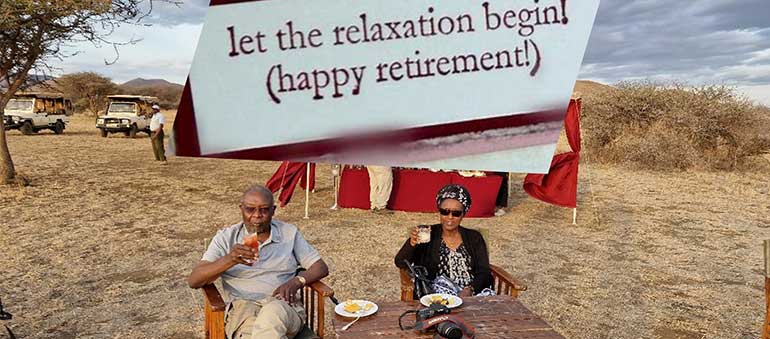Welcome to the Fork in the Road Blog: Reflections on Life, musings based on my perception of life, spanning decades of active life. This episode – Retirement – muses over life after formal employment.
Retirement from formal employment can be a time of mixed and conflicting emotions. It can be a time of unimagined opportunity for venturing out into new activities and an opportunity to explore places at leisure. It is also a time for reflection on the times gone by, achievements made, challenges faced, lessons learnt and failures. It is a time for decision-making on the “new” life one faces. And that it is a point in life when several decisions must be made.
Retirement can be statutory, elective, or involuntary. Statutory retirement could be because of reaching a particular (retirement) age or end of the contractual period of employment. Whatever type of statutory retirement, one knows, at the start of the new job, when one’s last working day in that employment will be. The reality is that one does not think of retirement at the start of work in a new job.
The concept of retirement may not exist for many people in the world. Some people stop working because of physical challenges, or lack of resources to continue working, or circumstances that would have insidiously eroded their working life. I am musing over retirement for people who are in formal, and often regimented, working environment.
The “view” ahead of retirement can be daunting with its connotation of either being aged or not wanted anymore for the job you have been doing. Preparation for the life after separation from formal employment is, therefore, extremely important. Ideally, preparations should not be done as a panic realization that the time has come to separate from the formal employment and no plans had been made for the eventuality. It is important, therefore, to consider it when one is starting a new employment. Career guidance should include end of employment in the guidance. Starting retirement without prior preparation is like being thrown into the swimming pool’s deep end at the start of a swimming lesson.
Whatever working environment we may be involved in, we are interacting with other people impacting our work. The longer we stay in an employment the more extensive the number of people we interact with, and the deeper the interactions, become. Some develop into friendships or mentorships. They become part of our daily social life fabric.
Retirement comes with several new realities. There is the loss of contact with colleagues one would have been used to be with. Despite the promise that “we will stay in touch” when goodbyes are being said during the last day at work, it soon dawns on one that apart from real friends, mere work colleagues, however close they might have been, fade away. In big organizations with communication domains, retirement becomes a reality call when contacts through the official channels are blocked, access to buildings restricted and so on. You would have turned a corner in your working life, and when you turn to look back you no longer see the terrain you have been walking through. You look ahead and the view is not revealing much of what it is hiding.
We do not realize how much time we spend away from home while go for work, for people in formal employment, until we retire. A person who had, for decades, waken up in the morning, dress up and “happily” leave home to go to work, finds himself or herself challenged with not knowing what to do, if they had not prepared themselves for it. The early days in retirement seem long, weeks are like months.
As life continues during retirement, the future can become gloomy as friends and colleagues die. This is an eventuality beyond one’s control. While you cannot control it, yet you can mentally plan for it by accepting its eventual happening. I have lost very close friends, relatives and colleagues who would have buttressed my retirement by just being there or by offering guidance in my newly found activities. These friends no longer being around me has not held me back in forging ahead with a fruitful retirement life. I let go of them but with unending fond memories. I accepted that they had passed on.
Mental and psychological acceptance of the inevitable change in social interactions during life in retirement, is fundamental to successful retirement. With passage of time and adaptation to the new situation, slowly new contacts, albeit reduced in numbers, may be made and new activities may be developed.
Retirement life does not have to be lonely. If one accepts the changed life and embraces the new, one can build a social environment fitting with the new circumstances. A new activity would come with new contacts who may develop into friends. All this is possible if one avoids self-isolation.
When opportunities occur for a change of lifestyle through friends, acquaintances, or total strangers, it is what you make of that opportunity that is important. The person or people through whom the opportunity materialized are not going to live the new life for you. This is your life’s journey. You are walking it either alone or with company. But, even if you have company, the company does not do the walking for you. Enjoy the company while you have it and use it to learn as much as possible of the journey you are travelling.
Like any journey, our lives journeys are built on the lives we have lived. Retirement offers space to remodel our past life structures. A clear mental aptitude to retirement is crucial for a smooth transition from formal employment. One, however, does not have to rebrand into a completely new profession. It is easier to use the foundation of one’s professional experience as a basis for new working situation at separation from formal employment if one does not move into another formal “8 to 5” employment. The work and the environment would be different, but the professional principles would be the same.
On the other hand, a complete switch to an entirely new “profession” may be appealing to someone who is adventurous. It is like coming to a point in a journey and decide that you are tired of continuing the journey using public transport and switch to a cycle. That is the freedom retirement offers to build a new life.
Whatever decision one makes, of whether to “retire” within one’ s professional sphere, or venture out into new areas, it boils down to realizing that this is your life. Acceptance that you have retired, for whatever reason, that retirement is not the end of the world but that you still have a life, energy, and mental capability to be productive. Consultation, formal or informal, on decisions of how to be occupied in the new retirement life is very helpful. If one has friends this is a stage in one’s life when they can be of great help.
Thank you for being part of the Fork in the Road Blogs: Reflections on Life. Be sure to look out for the next episode when I will be writing about death. If you gathered something useful, please feel free to share the blog. My books, Fork in the Road: Creating a future of value starting from where you are and A view round the bend. Setting goals for your life’s journey are available for purchase at Aristoc bookshops in Kampala, Uganda and online at Amazon.


Comments (10)
Shem Nnaggenda Nsubuga
That part about work colleagues and friends is an adjustment that doesn’t come easy.
Am uneasy about your next topic!!
Rtn Stephen
You are absolutely right about drawing a line between colleagues and friends.
Rosemary FFL
Thanks for sharing insights into retirement and emphasising the fact that retirement can be enjoyed, if well planned. You are a living example of one who planned well and is enjoying retirement.
Rtn Stephen
Thanks, Rosemary. Work on it and you will find that it is worth the effort.
Francis Omaswa
Great piece Stephen. I have retired several times and can confirm that planning for retirement is critical to having an enjoyable post retirement life which in some cases can be long. Please keep going.
Rtn Stephen
Thanks Francis. Work on your ultimate retirement.
Enoka
Advice about retirement is a useful as advice to soon to be married lovers. I have been retired now for 8 years and at 79 years I have no regrets because my retirement plan was NOT TO HAVE A PLAN AT ALL.
Understand the concept of determinism without Free Will and retirement without a plan will make sense
Rtn Stephen
Lucky you for having a successful non-plan. Sometimes we plan without realizing that we are actually in a planning mode.
Harriet Nabakooza MUSOKE
I have been in retirement for 2.5 years now but because I was ready so far so good, despite the loss of my dad and brother in law. Re deployment is new word used nowadays I am busy but doing things I am enjoying. Great topic
Rtn Stephen
Rtn Harriet I salute you. We are walking on the same road. Enjoy the journey